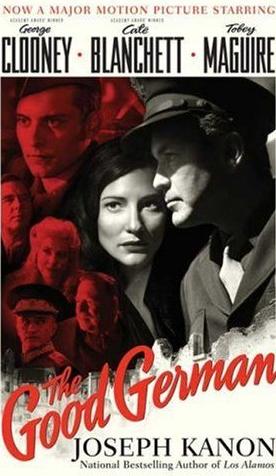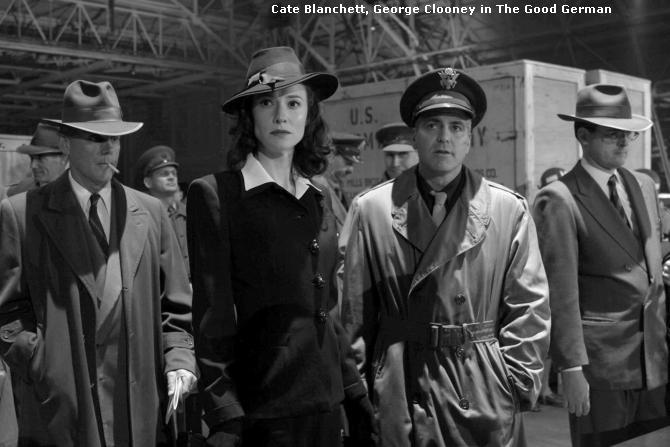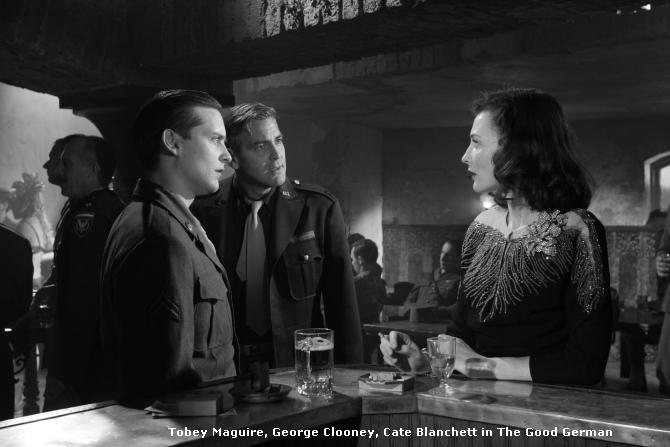GOOD GERMANS, BAD NAZIS &
UGLY COMMIES
by Ben Pleasants, guest contributor.
[March 24, 2007]
 [HollywoodInvestigator.com]
If you've been reading fiction lately, you may be aware of an interesting
phenomenon:
the suspense novel that crosses into literature. Take Joseph Kanon's The
Good German. [HollywoodInvestigator.com]
If you've been reading fiction lately, you may be aware of an interesting
phenomenon:
the suspense novel that crosses into literature. Take Joseph Kanon's The
Good German.
The novel was a hit, although Steven Soderbergh's
film adaptation disappeared at the box office before anyone had a chance
to see it. Yet the film's every bit as good as the book, and the
book is as good as Greene's The
Third Man, Hemingway's The
Sun Also Rises, and LeCarre's Smiley's
People.
You care so much about Kanon's
characters, you don't want to let go. He recreates a place and time
that's been in our consciousness forever, but in an undefined way until
now. Berlin, right after World War II. The
Potsdam Conference.
That's enough for a good Bourne in Berlin, but what makes this literature, not just a Hitchcock thriller,
are the book's moral questions.
Lena Brandt uses her sexuality
to survive Nazis, Stalinists, and Americans. She epitomizes the city
of Berlin post-World War II. Desperate, terrified, yet hopeful.
Renate Naumann is a "greifer"
or "grabber of Jews," who is Jewish herself. She's on trial for betraying
her
people to the SS to save the life of her young son. Soderbergh removed
Renate from the
book, grafting her crimes onto Lena. That made Lena so dark,
it ruined the film.
Jake Geismar, an American,
was Lena's lover before and after the war. He's a Jake
Barnes-like reporter who takes us on a very noir 1940s tour through
postwar Berlin. The city itself is the real star. Kanon is
a master of atmosphere.
Emil Brandt is Lena's chemist
husband. The Americans and Russians both want to recruit Emil, despite
his work in SS concentration camp "experiments." We know the US hired
these
guys, denying their involvement in war crimes.
Kanon brings the conundrum
into focus: Who is the good German?
One is Emil's scientist father,
Professor Brandt, who stayed in Germany but refused to work for National
Socialism. He hates what his son did as a "scientist." Brandt
is dropped from the film, though he's the ethical German, the conscience
who observes politics turning into murder.
Then there's Captain Teitel,
a German-born American Jew who returns to prosecute war criminals while
Congressman Breimer, friend of I.G. Farben, recruits Werner Von Braun's
colleagues.
For those who read history
and like Immanuel
Kant, the book's a treat. But Kant is dropped from the film;
only gray materialism triumphs. Grayer than The
Third Man.
Joseph Kanon prefers to be
called Joe. I told him he'd written a major work of literature, not
just a commercial suspense novel. He thought it was a love story,
both for Berlin, and between Lena and Jake. He was amused at my enthusiasm.
Ben
Pleasants: Considering that you were born after 1946, how
did you bring Berlin to life, street by street, district by district, with
such skill? And might I add, sympathy. "Nobody walks quickly
over rubble."
Joseph Kanon:
I've never lived in Berlin, but I've been there, and sometimes feel as
if I've walked the whole city. The best way of getting to know a
city. Not every place strikes an imaginative resonance, but Berlin
did with me -- parts of it I felt I knew instinctively.
Researching The
Good German presented a challenge because the Berlin of 1945 doesn't
exist. Nearly the entire center was leveled by bombing. Street
names
have changed. But I wanted to write about the Allied Occupation,
and the buildings they used, by definition, had survived the bombing. You can still see where the Control Council met, the headquarters for the
Kommandatura.
Other sources are movies made
at
the time. The
Murderers Are Among Us, Rossellini's Germany
Year Zero, some scenes in Zinnemann's The
Search.
Print sources were valuable. Diaries, letters, journalism, often as interesting for what they omit as
for what they notice. An extraordinary contemporary memoir is A
Woman in Berlin. Popular histories that lean heavily on personal
interviews
(e.g. The
Last Battle) are a good source.
But ultimately, you make the imaginative
leap and put yourself there. Whether you manage this successfully
is for readers to decide.
Ben:
You dedicate the book to your mother. There are interesting and powerful
women in this book. Was your mother influential in bringing any of
them to life?
Joseph:
No, it was simply my mother's turn for a dedication. No German connections. She spent the war years as an American bobbysoxer.
Ben:
Did it bother you that the screenwriter took such liberties with the book? The way he portrayed Lena. And he left out Emil's father, one of
the most interesting and ethical Germans in the book. Was something
lost? For me there was.
Joseph:
The cliché is that every writer wants his book made into a film,
but is disappointed/outraged when changes are made. But a movie isn't
illustrated text. Tully is a case in point. In a book, you
can discuss how a black market operates; in a film you must show it operating. So Tully's alive in the movie.
I admire Soderbergh. He
did extraordinary things with archival footage. The film is a triumph
of the 40's style. The cast was a dream cast.

Some changes seem bewilderingly
arbitrary. Jake now works for The
New Republic -- an unlikely press pass in '45 -- not Collier's. Congressman Breimer represents Schenectady, not Utica. Why? It's possible there was a reason. It's also possible the writer had
simply forgotten and couldn't be bothered to check.
The one change I found difficult
was confalting Lena with Renate, and dropping the love story. To
me, this was the heart of the book. But the book is not the movie.
Ben:
I'd say the point/counterpoint of the novel is the American prosecutor
Bernie Teitel, who seeks war criminals in 1945, against Congressman Breimer,
who seeks scientists for the next war between the US and the USSR. Were you conscious of this tension?
Joseph:
What interests me is the moral gray area of war and its aftermath. It corrupts all, even the well-meaning. On the one hand there is
moral outrage and demand for justice; on the other, the demands of self-interest
and realpolitik. Most characters act somewhere between cynicism and
good intentions. The war begins with Casablanca,
all sharp black and white, but it ends with The
Third Man, a murkier, gray area of moral compromise. The era
that began our own.
Ben:
Lena is fascinating. Did you fall in love with her yourself?
Joseph:
Whenever you do a love story, you should be a little bit in love with the
character.

Ben:
I love the contrast between Professor Brandt and his son, Emil. Brandt
says "They [the Nazis] destroyed Germany. The books, then everything.
It wasn't theirs to destroy. It was mine, too. Where's my Germany
now? Look at it. Gone. Murderers." Lena replies,
"Emil wasn't that." But the professor knows that is not true. He answers, "Be careful when you put on a uniform. It's what you
become."
Joseph:
Brandt is a decent, cultured man who's seen his society hijacked by gangsters
and led to its doom. Worse, he's seen his son become part of that. A tragic moment. But it's also youthful naivete and ambition. Science is young man's game. For all Emil knew, the Nazis might be
in power for his entire lifetime. How does he arrange his life? His work? There is some resonance with Speer,
who seems, according to the memoirs (often disingenuous), to have thought more of his architectural ambitions
than moral issues.
Ben:
Renate's trial has an ironic twist. Her defense lawyer observes "in
1944 it was against German law to hide Jews." The judge responds
"are you suggesting that Fraulein Naumann acted correctly?" Her attorney
replies "I'm suggesting she acted legally." Is that your gray area,
where law and ethics are at war?
Joseph:
When laws are made by thugs, there can be no ethical basis -- only a formal
semblance of ethical order. Judges in Germany were asked to administer
appalling laws. A conundrum for anyone professing belief in the abstract
rule of law. Of course, debating fine hair differences is also a
legal tactic that shows how hopelessly complicated rendering justice in
postwar Germany was.
Ben:
How did you invent Emil Brandt? We know Von Braun was not exactly
clean. Yet he is not the epitome of evil, either. Is Emil in
any way sympathetic to you?
Joseph:
I suppose we'd all like to think we couldn't be Emil -– but couldn't we? He believes in himself, in science. He does not see himself as an
enabler
of evil. With youthful personal ambition, a sense of intellectual
detachment, a weak moral center, Emil's the kind of man who'd go along
and make excuses later. Not unlike most of us. He's not Himmler
or Heyditch, true monsters and ideologues.
Ben:
To me, the book's Gunther Behn is the good German. He's a policeman. He has a Jewish wife. He protects her. You have him say, "You
think I abandoned her? Marthe? She was my wife." Then
he breaks down. This is the gray area of the real world, the world
of choices that are very bad and terrible What did you have in mind
when you created this conflicted, almost Dostoevskian policeman?
Joseph:
Gunther, as a good policeman, is conflicted by the demands of the Third
Reich.
Trapped by them. Technically, he's asked to help murder his own wife. Instead, he hides her. Illegally. He ends up losing his wife
to the Holocaust, and himself to bitter and self-destructive cynicism. Sometimes there are no neat solutions. Gunter tries to do the right
thing for the right reason, but loses himself in the process, overwhelmed
by a history no individual can control.
Ben:
Both Harry Lime [in The
Third Man] and Emil engage in terrible things. Emil in starvation
experiments, Harry selling watered-down penicillin. Isn't this a
case of Darwinian survival of the fittest?
Joseph:
Jake saves Emil for Lena's sake, but also for ours. One side or the
other is going to use his scientific skill. Whatever the moral quandary,
it is better that it be ours. I don't see it as Darwinian, though
the Occupation became complicated and compromised. The good German
is the one useful to us.

Ben:
What were your sources on the Soviets at Potsdam?
Joseph:
The best book is Meeting
At Potsdam. I've read Robert
Conquest and The
Fall of Berlin. Vassily
Grossman is worthwhile. All agree on the appalling behavior of
the Russians once they took the city. The Russian statue is referred
to as the Tomb of the Unknown Looter.
Over 100,000 rapes were reported
in the first weeks. Imagine the full unreported scope. Things
were so barbaric, even the Russian command became alarmed. Of course,
all this was no worse than what the Germans had done in Russia. It
was a particularly nasty war on both sides. One reason Americans
were enthusiastically received was simply because they weren't Russians.
Ben:
How do you keep the plot and characters straight as you move along?
Joseph:
I tend to make up the story as I go along, not follow an outline. I like to have my characters surprise me. One of the pleasures of
writing is feeling the text take on its own momentum.
Ben:
What have German readers said?
Joseph:
The book was well received in Germany. The war and its aftermath
are still living subjects there, endlessly debated and evaluated. I went to Berlin for interviews, and everywhere met enthusiastic readers. Some had been in Berlin at the time and said the book was accurate.
Ben:
Your novel, Alibi,
is also set in the 1940s. Could you compare it to The
Good German?
Joseph:
It's set in postwar Venice. The anti-Berlin, where nothing happened. No bombs were dropped. People sat out the war. Yet the war
had a way of intruding.
For me, The
Good German is the richest and most complicated of my books. But it's all up to the reader to judge
Ben:
It's a great book. Thank you, Joe. This has been a pleasure.
Copyright 2007 by Ben Pleasants.

|
